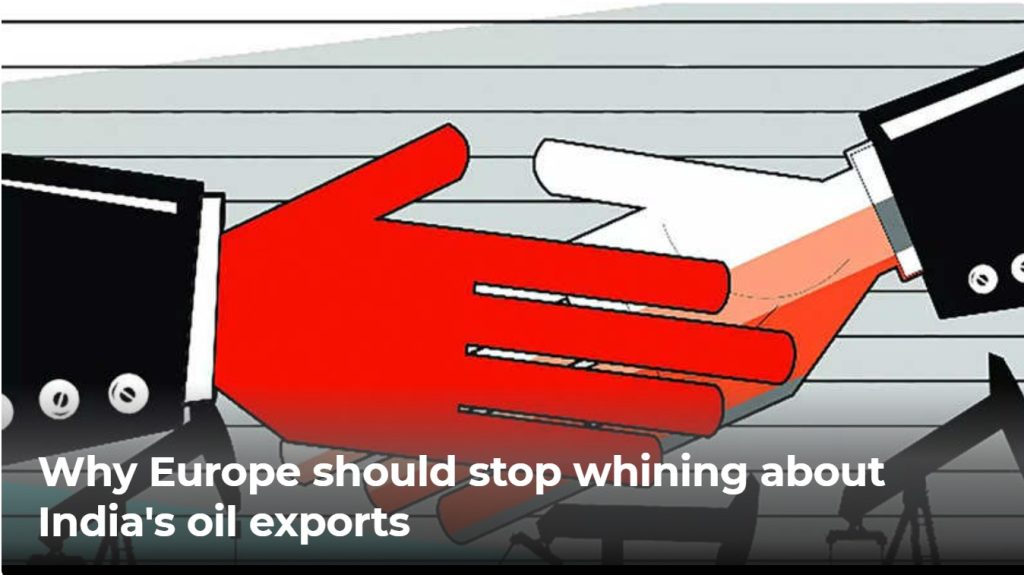India has long been a large diesel exporter to the EU, and such exports have risen sharply in the last year. India should emphatically reject Borrell’s accusation and insist on its right to export diesel to the EU regardless of where it buys crude oil from. Under the rules of the World Trade Organisation, once Russian oil is converted by India into refined products like diesel, those cannot be described as Russian and are unambiguously Indian.
In effect, Borrell is accusing India of laundering sanctioned Russian crude into sanctions-free Indian diesel. But refining is an industrial process, not mere washing. In an oil refinery, crude is converted into a wide range of products—diesel, petrol, naphtha, kerosene, fuel oil, bitumen and coke. This is manufacturing, not laundering.
Second, Indian refineries import crude from a wide variety of sources, and it may be impossible to know which barrel of diesel originates from which barrel of crude. Many refineries use a blend of different crudes to get the best yield of desired products.
Different varieties of crude have widely differing ingredients, and light crudes are more valuable since they yield a higher proportion of products like petrol and kerosene. The acid and sulphur content of crudes varies and makes a big difference to price and yield. India’s export-oriented refineries simultaneously strike deals to import specific crudes and export specific products, aiming for a mixture of crudes that will yield the most profitable mix of products.
India has a high deficit of some products like liquefied petroleum gas, which is imported in large quantities. But it has a large surplus of other products, with the surplus depending on local demand and the yield of different products from different crudes. It is one of the world’s biggest exporters of refined products.
The plain fact is that the EU has a diesel deficit. India has a diesel surplus which has to be exported somewhere.
India has two export-oriented refineries, Reliance and Nayara (which used to be called Essar Oil but was later purchased by Rosneft of Russia). These account for more than half of all oil imports from Russia and are major diesel exporters. The other major diesel exporter is the public sector Mangalore Refinery and Petrochemicals Ltd, which uses mostly Gulf crude but has also recently bought Russian crude.
Rosneft, owner of Nayara, is a major Russian oil company. Some crude being imported by Nayara may well be from its own captive fields in Russia. This makes the EU even more uncomfortable. Russian crude is being refined by a Russian company in India and the resulting diesel is being sold to Europe. One can understand Borrell’s worry that the optics of the deal appear to show some sort of evasion of sanctions even if it is compliant with WTO rules. But the optics are very misleading.
First, note that the biggest buyer of Indian diesel is the US, the country at the very forefront of anti-Russian sanctions. When the US finds imports of diesel from India okay, why should the EU behave differently?
Second, the aim of the sanctions is to hurt Russia, not India. Russia is hurt by having to sell crude at a discount to India. But that hurt remains the same regardless of whether India uses Russian crude to produce products for domestic consumption or export to the US, EU, Iraq, or anywhere else.
The plain fact is that the EU has a diesel deficit. India has a diesel surplus which has to be exported somewhere. Suppose Nayara is currently exporting diesel to Europe using mostly Russian crude, whereas the Indian Oil Corporation (IOC) is using Gulf crude to export diesel to Sri Lanka. Will it make any geopolitical difference if Nayara sells instead to Sri Lanka and the IOC to EU? Absolutely not.
India should emphatically reject Borrell’s accusation and insist on its right to export diesel to the EU regardless of where it buys crude oil from.
The cost of sanctions and hurt to Russia will remain the same. The cost to EU consumers will remain the same. The two oil companies will face slightly different transport costs with some marginal impact on their profits. But the geopolitical situation will not change at all. Hence, it makes no sense for the EU to claim that sanctions are somehow being violated.
Nayara is owned by Russia’s Rosneft. If the EU has imposed sanctions specifically on Rosneft, it may be entitled to keep Nayara’s diesel out of the EU. But it cannot restrict diesel from other Indian refiners regardless of where they buy crude from.


